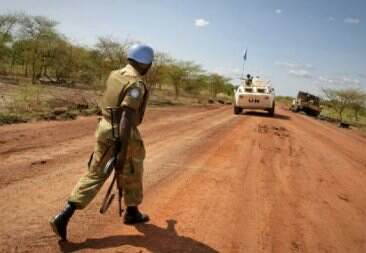South Sudan recommends international protectorate for Abyei
July 14, 2015 (NEW YORK) – The South Sudanese ambassador to the United Nations Tuesday reiterated his government rejection to establish a joint administration and called to put the disputed area of Abyei under international protectorate.

“I believe that some refinement of the present arrangements under UNISFA that would turn the area into an international protectorate to ensure security, provide services and generate socio-economic development is the most practical way forward,” said Deng who hails from Abyei region.
He further said the protectorate would enable Juba and Khartoum to negotiate the final status of Abyei in an atmosphere of relative cooperation between the countries.
In August 2013, the ruling National Congress Party refused calls to place Abyei under international trusteeship stressing what is needed is the establishment of a local administration and a police for ensure security and stability.
However it is the first time that the South Sudanese government propose the international protectorate to end the deadlocked negotiations on the final status of Abyei area.
Since the signing of 2005 accords, the two government failed to hold a referendum over the fate of the disputed region as they continue to diverge over who can take part in the vote.
Further the two countries failed to establish a joint administration in Abyei in line with the 20 June 2011 agreement. Juba says there is no need for this administration pointing there is only a need to conduct the referendum to determine the future of the region.
T”he nine chiefdoms of Abyei have always been administered autonomously. What is called for now is, just as the Misseriya are self-administering within their area of normal residence, the Ngok Dinka need to have all organs of Government -legislative, executive and judiciary -under their autonomous control.”
Ambassador Deng went to say that issues of common interest between the Ngok Dinka and Misseriya can be managed through a cooperation body. He reiterated that the
“Any idea about a joint administration, whereby the Misseriya, while fully self-governing, participate in the administration of Ngok Dinka area would be unacceptable by normative standards and would be rejected by the Ngok Dinka and the Government of South Sudan,” he said.
In its resolution, the Security Council reiterated its demand that Sudan and South Sudan urgently establish the Abyei Area Administration and legislative council, by resolving the deadlock over the composition of the Council, and constitute the Abyei Police Service.
The acting Sudanese permanent representative to the United Nations, Hassan Hamid Hassan, praised the 15 member body for emphasizing on the need to implement the signed 20 June 2011 agreement.
Hassan (Sudan), stressed that there was no alternative to dialogue, he said, warning against unilateral measures.
(ST)
